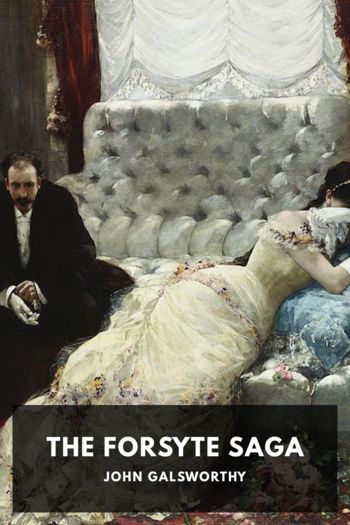The Forsyte Saga - John Galsworthy (best english novels for beginners .txt) 📗

- Author: John Galsworthy
Book online «The Forsyte Saga - John Galsworthy (best english novels for beginners .txt) 📗». Author John Galsworthy
Encountering in the name of this stranger something outside the range of his philosophy, Swithin paused. A misgiving arose within him! It was impossible to tell! June was only a girl, in love too! Emily (Mrs. James) liked a good glass of champagne. It was too dry for Juley, poor old soul, she had no palate. As to Hatty Chessman! The thought of this old friend caused a cloud of thought to obscure the perfect glassiness of his eyes: He shouldn’t wonder if she drank half a bottle!
But in thinking of his remaining guest, an expression like that of a cat who is just going to purr stole over his old face: Mrs. Soames! She mightn’t take much, but she would appreciate what she drank; it was a pleasure to give her good wine! A pretty woman—and sympathetic to him!
The thought of her was like champagne itself! A pleasure to give a good wine to a young woman who looked so well, who knew how to dress, with charming manners, quite distinguished—a pleasure to entertain her. Between the points of his collar he gave his head the first small, painful oscillation of the evening.
“Adolf!” he said. “Put in another bottle.”
He himself might drink a good deal, for, thanks to that prescription of Blight’s, he found himself extremely well, and he had been careful to take no lunch. He had not felt so well for weeks. Puffing out his lower lip, he gave his last instructions:
“Adolf, the least touch of the West India when you come to the ham.”
Passing into the anteroom, he sat down on the edge of a chair, with his knees apart; and his tall, bulky form was wrapped at once in an expectant, strange, primeval immobility. He was ready to rise at a moment’s notice. He had not given a dinner-party for months. This dinner in honour of June’s engagement had seemed a bore at first (among Forsytes the custom of solemnizing engagements by feasts was religiously observed), but the labours of sending invitations and ordering the repast over, he felt pleasantly stimulated.
And thus sitting, a watch in his hand, fat, and smooth, and golden, like a flattened globe of butter, he thought of nothing.
A long man, with side whiskers, who had once been in Swithin’s service, but was now a greengrocer, entered and proclaimed:
“Mrs. Chessman, Mrs. Septimus Small!”
Two ladies advanced. The one in front, habited entirely in red, had large, settled patches of the same colour in her cheeks, and a hard, dashing eye. She walked at Swithin, holding out a hand cased in a long, primrose-coloured glove:
“Well! Swithin,” she said, “I haven’t seen you for ages. How are you? Why, my dear boy, how stout you’re getting!”
The fixity of Swithin’s eye alone betrayed emotion. A dumb and grumbling anger swelled his bosom. It was vulgar to be stout, to talk of being stout; he had a chest, nothing more. Turning to his sister, he grasped her hand, and said in a tone of command:
“Well, Juley.”
Mrs. Septimus Small was the tallest of the four sisters; her good, round old face had gone a little sour; an innumerable pout clung all over it, as if it had been encased in an iron wire mask up to that evening, which, being suddenly removed, left little rolls of mutinous flesh all over her countenance. Even her eyes were pouting. It was thus that she recorded her permanent resentment at the loss of Septimus Small.
She had quite a reputation for saying the wrong thing, and, tenacious like all her breed, she would hold to it when she had said it, and add to it another wrong thing, and so on. With the decease of her husband the family tenacity, the family matter-of-factness, had gone sterile within her. A great talker, when allowed, she would converse without the faintest animation for hours together, relating, with epic monotony, the innumerable occasions on which Fortune had misused her; nor did she ever perceive that her hearers sympathized with Fortune, for her heart was kind.
Having sat, poor soul, long by the bedside of Small (a man of poor constitution), she had acquired the habit, and there were countless subsequent occasions when she had sat immense periods of time to amuse sick people, children, and other helpless persons, and she could never divest herself of the feeling that the world was the most ungrateful place anybody could live in. Sunday after Sunday she sat at the feet of that extremely witty preacher, the Rev. Thomas Scoles, who exercised a great influence over her; but she succeeded in convincing everybody that even this was a misfortune. She had passed into a proverb in the family, and when anybody was observed to be peculiarly distressing, he was known as a regular “Juley.” The habit of her mind would have killed anybody but a Forsyte at forty; but she was seventy-two, and had never looked better. And one felt that there were capacities for enjoyment about her which might yet come out. She owned three canaries, the cat Tommy, and half a parrot—in common with her sister Hester;—and these poor creatures (kept carefully out of Timothy’s way—he was nervous about animals), unlike human beings, recognising that she could not help being blighted, attached themselves to her passionately.
She was sombrely magnificent this evening in black bombazine, with a mauve front cut in a shy triangle, and crowned with a black velvet ribbon round the base of her thin





Comments (0)